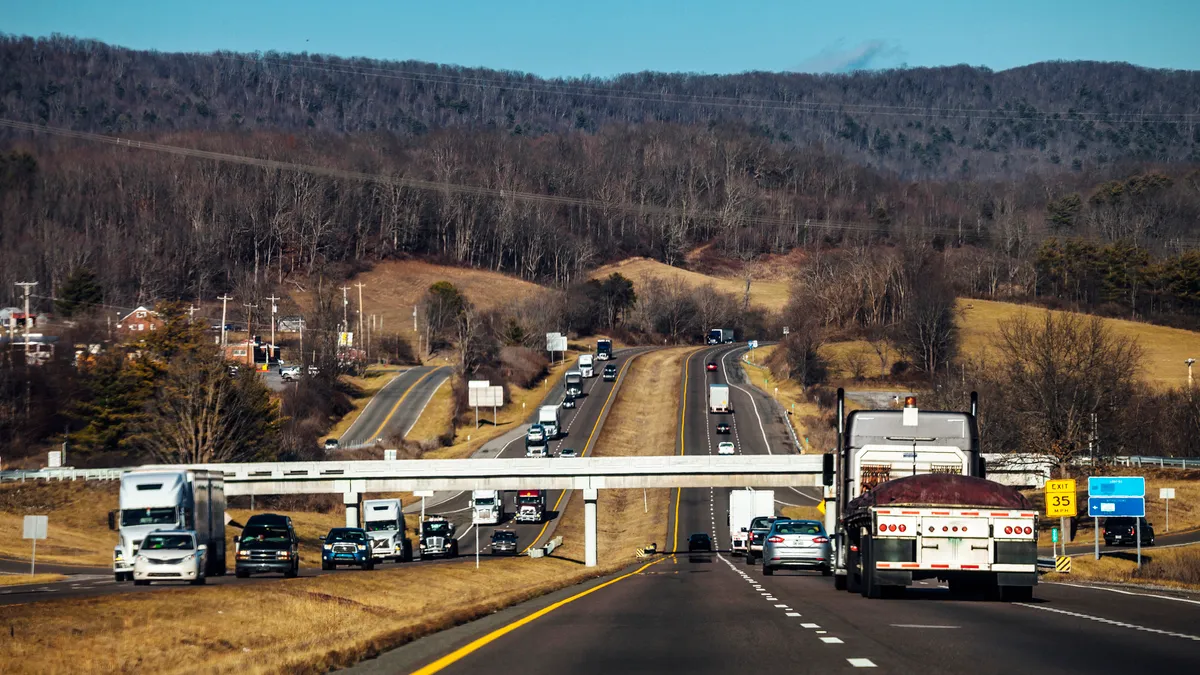Truck parking, restroom access and upcoming speed limiter regulations are among truck drivers’ chief concerns in 2023.
“Truckers are vital, vital, vital people,” said Lewie Pugh, executive vice president of the Owner-Operator Independent Drivers Association. “They're not these bad guys running up and down the road in these massive trucks trying to run people over and all this craziness. They're just good, family, hardworking people.”
Pugh traveled to Washington, D.C., late last month for a marathon 25 meetings on Capitol Hill and at the Department of Transportation. In a conversation with Transport Dive, he shared the association’s priorities and goals for 2023.
Truck parking
A perennial problem for the industry, the lack of adequate truck parking was drivers’ top concern for the third straight year in 2022, according to the American Transportation Research Institute. Just one parking spot exists for every 11 trucks on the road, OOIDA says, forcing drivers to resort to parking on highway ramps and even at a funeral home.
The Truck Parking Safety Improvement Act, introduced by Sens. Cynthia Lummis and Mark Kelly, would invest hundreds of millions of dollars in additional parking to address the shortage. Pugh met with both senators, as well as Reps. Angie Craig and Mike Bost, who introduced parking legislation in their respective chambers. Craig and Bost’s House bill cleared the Transportation and Infrastructure Committee in July.
“It seems like that’s our big priority every year, lately,” Pugh said. “But I think we’ve got pretty good traction this year, coming off last year. We’re going to get a bill in the House and in the Senate, hopefully pretty quick, and we’ll get that passed. We know this is something truckers have been needing for 20, 30 years. ... It’s just gotten worse.”
Speed limiters
The Federal Motor Carrier Safety Administration received about 16,000 comments in response to its renewed proposal to require the use of speed limiters inside heavy-duty trucks.
While speed limiters could help lower fleets’ fuel costs, OOIDA disputes their value as a safety measure.
“We as an association do not believe speed limiters are a good idea,” Pugh said. “We think it will have a counter effect on safety.”
Requiring speed limiters could have unintended consequences, such as more road rage incidents when passenger vehicles are unable to pass speed-limited trucks, and truck drivers potentially trying to make up lost time by driving faster on smaller roads with lower speed limits.
“I understand why some people are asking for this because they've had a tragedy in their lives or something like that, and that's understandable,” Pugh said. “But this isn't the way to fix the problem they're trying to fix.”
Restroom access
During the COVID-19 pandemic, many warehouses limited truck drivers’ access to their restrooms as a measure to prevent the spread of the virus.
As the country has increasingly pushed past the pandemic, many of those restroom doors have remained locked.
Pugh’s trip to the Hill also included visits with Reps. Troy Nehls and Chrissy Houlihan, who introduced a restrooms bill in the House. Nehls told Land Line he expects the law to pass with bipartisan support.
Pugh, who drove a truck for 26 years, said the issue shows how drivers go from being viewed as heroes to nuisances as soon as supply chains settle and shelves are stocked with food, toilet paper and other essentials.
“I never thought I’d be in Washington, D.C., talking about making a law to [allow truck drivers to] use the bathroom,” Pugh said.
THANK YOU to @RepHoulahan for being a leader in the fight for #trucker access to restrooms when loading and unloading cargo. pic.twitter.com/Jj0DgpUbJ8
— Owner-Operator Independent Drivers Association (@OOIDA) January 30, 2023













